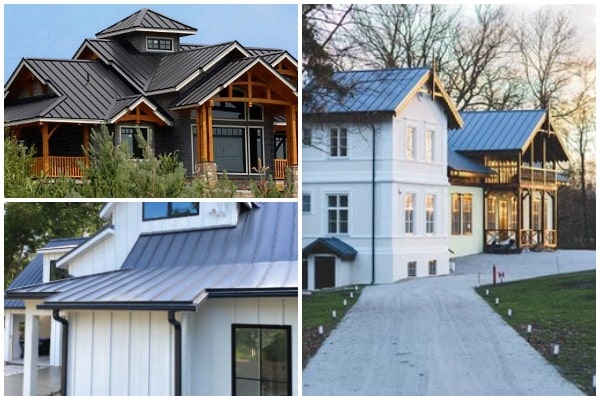If you are considering installing a new metal roof, or you already have one, you are in the right place to understand your roof. The first question that pops into my mind when I see a metal roof is how old it is. And I am not a rare case. In fact, homeowners aim for a metal roof for its long, long lifespan, even knowing it has a costly primary installation.
In this guide, I will explain and focus on the durability of metal roofs. I will explore how many years can be counted as a long lifespan based on the average lifetime of regular metal roofing materials. You will understand the factors that influence their stability. You can read more if you want to learn about metal roofing.
Let’s explore the article.

Average Lifespan of Different Metal Roofing Materials
Each metal roofing material has its own expected lifespan. However, their lifespan varies because of numerous factors, like their installation process and how they are maintained. Furthermore, climate, and roof design have significant influences. I will discuss those factors more elaborately in the next sections.
As mentioned above, different metal roofing materials have different lifespans. For example, steel roofs typically last between 30 and 50 years, while aluminum roofs can endure for 40 to 70 years. Copper roofing can have an exceptional lifespan of over 100 years due to its corrosion resistance and weathering properties.
Zinc roofs form a protective layer. You can expect them to last 80 to 100 years. Galvalume roofs do not last that long, lasting somewhere between 30 and 60 years of service with their steel-aluminum-zinc composition. On the other hand, tin roofs have an average lifespan of 40 to 60 years, while galvanized steel roofs last only 20 to 40 years.
But if you go for stainless steel roofing, which is highly resistant to corrosion, your roof will endure for over 50 years.
Why Does the Durability of Metal Roofing Matter?
Now you can ask me if the longevity of metal roofing matters to a homeowner. Or people overly thinking of it. That sounds like a legit question.
Let me explain in the next few points, where you will see a number of benefits brought to you by a carefully chosen metal roofing material.
- Long Lasting: Compared to many other roofing materials, metal roofing (not all of them, but most of them) lasts longer, and that benefit is really worthy. Investing in a durable metal roof means that you will be secure and relaxed for at least 40 years (average).
- Cost Saver: Some people complain about the costly installation process of metal roofing. However, if you consider its longevity and lower maintenance, you realize that avoiding frequent roof replacements and repairs reduces overall maintenance expenses.
- Weather Resistant: Metal roofs are among the best outdoor materials for resisting natural weather elements such as rain, snow, hail, wind, and UV rays. Because of the protective layer, they are less prone to damage caused by extreme weather events.Low Maintenance: Metal roofs typically require minimal maintenance compared to other roofing materials. Their durability means that they can withstand wear and tear, reducing the need for frequent inspections and repairs.
- Insurance Benefits: This is really a game changer if you really care for your home’s health. There are so many insurance companies that recognize the durability of metal roofing and offer lower insurance premiums as a result, allowing additional cost savings for property owners.
- Good Property Value: A durable metal roof not only enhances the aesthetics of your home but also the overall value of a property. Metal roofs are popular for their low maintenance costs. So, if you have a metal roof, prospective buyers will often be willing to pay you more than for a traditional home roof.
- Peace of Mind: A durable roof means a secured and reliable roof. You are not just setting up your metal roof; you are going to have peace of mind knowing that a solid layer is sheltering you over your head.
Main Factors Influencing the Durability of Metal Roofs
Proper Installation Process
Like any other roof, the durability of metal roofs starts with a quality installation. You can’t deny the importance of seeking assistance from experienced professionals. With the right hand, the roof’s structural integrity is ensured, reducing the risk of premature failure.
So what if you ignore professionals to save some bucks? Well, a poorly installed metal roof might be affected by leaks, rust, or other issues that will surely compromise its performance.
Regular Maintenance
Routine inspection and maintenance play a significant role in extending the lifespan of your metal roofs. It’s crucial to identify and address issues promptly to prevent them from escalating into more significant problems.
Roofing experts usually recommend inspecting metal roofs at least twice a year. Especially after a severe weather event like a hurricane or heavy storm, roof checking is a must. Regular maintenance also includes cleaning debris and gutters. And do not forget to check for a single sign of corrosion or damage. If you can resist the smallest cracks or faults, you can expect your metal roofs to last 20 to 50 years, or even longer (up to 100 years!).
Natural Climates
The health and lifespan of metal roofing are directly and significantly dependent on the climate and environment. For example, in coastal areas, metal roofs exposed to saltwater and corrosive elements can deteriorate quickly. Besides, extreme weather conditions, including heavy snow or intense summer heat, can adversely affect the performance of metal roofs over time.
Final Wraps
Finally, I hope you now understand the fundamental things that influence your metal roof’s health and durability. Now you can decide whether you should opt for a metal roof or a slate, asphalt, or other type of roof.
I will suggest you consult with your local roofers or contractors to get the best idea of which materials are most suitable. Don’t forget to take the advice of your neighbors, too.